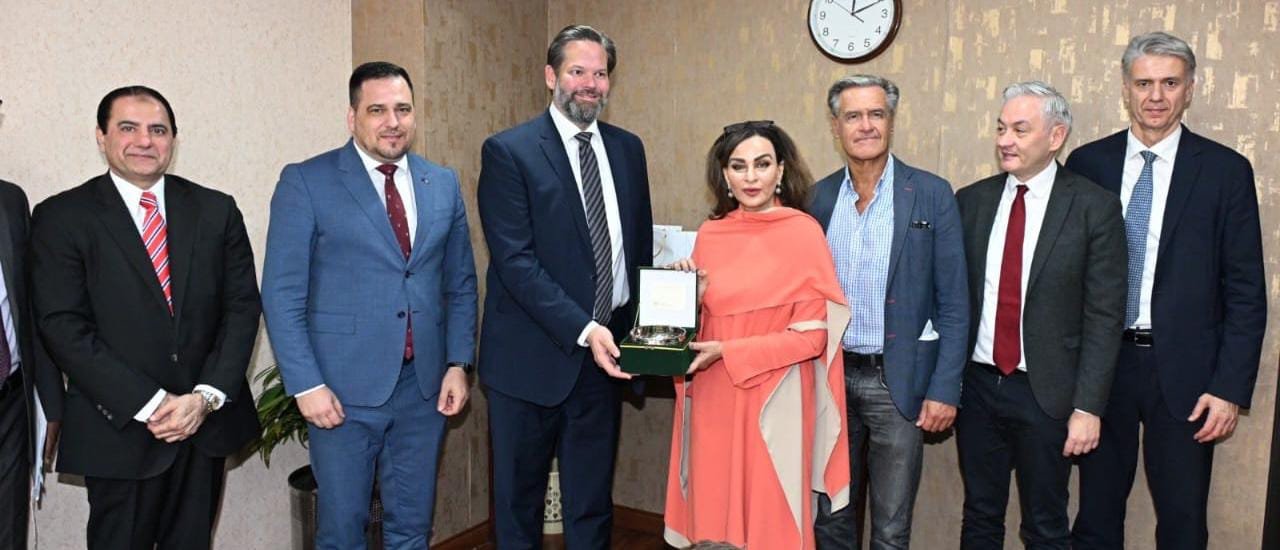Islamabad (TDI): Senator Sherry Rehman, Chairperson of the Senate Standing Committee on Climate Change, chaired a meeting with a visiting European Union Parliamentary Delegation from the Committee on Development (DEVE) at Parliament House.
The delegation was led by MEP Lukas Mandl (EPP, Austria), Robert Biedroń (Vice Chair, DEVE), alongside senior Members of the European Parliament.
Senator Rehman welcomed the delegation, noting that parliament-to-parliament, bilateral diplomacy is essential for developing shared responses to global challenges, particularly in the areas of development cooperation, climate resilience, trade public health, displacement, and the ongoing humanitarian crises.
On economic cooperation, Senator Rehman stressed the importance of the EU’s support for continuation and expansion of GSP+, noting that Pakistan’s exports to the EU stand at $9 billion within a $12 billion trade volume, EU is Pakistan’s second most important trading partner, accounting for 12.4% of total trade in 2024.
“Trade uplifts societies and creates the jobs we need. We look forward to expanded cooperation, including through the EU Global Gateway Initiative and the upcoming EU-Pakistan Business Forum.”
Read More: Pakistan, EU Parliamentary Delegation Reaffirm Partnership Under GSP+ Framework
MEP Lukas Mandl, Chair of the Delegation, expressed appreciation for Pakistan’s welcome and emphasized the importance of direct engagement between elected representatives.
Robert Biedroń (Vice Chair, DEVE) acknowledged Pakistan’s efforts in climate negotiations and adaptation planning “We recognize Pakistan’s role in global climate discussions and the significant pressure the country faces from climate change.”
Senator Rehman addressed the delegation’s questions, underscoring the scale of climate impact on Pakistan “In 2022, one-third of Pakistan was under water. Even this year, 6.5 million people have been impacted directly by flooding triggered by climate change.”
“Communities lose lives, livelihoods, livestock, land, and the ability to regenerate soils. This deepens poverty and erodes human resilience. Pakistan contributes less than 1% of global emissions, yet we are on the frontlines of climate crisis,” she added.
Read More: EU Extends Condolences Over Flood Losses in Pakistan
On social protection and women’s empowerment, she said that the Benazir Income Support Program is empowering women at the household level, and is even recognized globally by World Bank as a successful model of women inclusion.
She emphasized population growth as a compounding pressure, especially when combined with climate stress, food insecurity, and limited adaptive capacity.
Both sides acknowledged that climate change, economic resilience, and human development are deeply interconnected challenges requiring sustained partnership.
They agreed to continue structured bilateral engagement, expand development cooperation, and strengthen parliamentary exchanges going forward.

Sohail Majeed
Sohail Majeed is a Special Correspondent at The Diplomatic Insight. He has twelve plus years of experience in journalism & reporting. He covers International Affairs, Diplomacy, UN, Sports, Climate Change, Economy, Technology, and Health.



